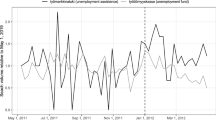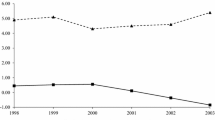Abstract
This paper examines the influence of unemployment insurance (UI) on the length of nonemployment spells experienced by young workers. The analysis introduces a flexible duration model to estimate the effects of the weekly benefit amount and weeks of eligibility on the amount of time spent between jobs by men, distinguishing between the experiences of UI and non-UI recipients. The empirical findings suggest three conclusions: (1) UI recipients experience longer spells of nonemployment than their non-UI recipient counterparts, at least up to the point of exhaustion of UI benefits; (2) the level of the weekly benefit amount does not significantly affect the length of nonemployment spells; and (3) increasing the number of weeks of eligibility offered by a UI program leads to longer episodes of nonemployment.
Similar content being viewed by others
References
Cameron AC, Gritz RM, MaCurdy T (1989) The effects of unemployment compensation on the Unemployment Experiences of Youths. Final Report prepared for the US Department of Labor, Bureau of Labor Statistics
Danziger S, Haveman R, Plotnik R (1981) How income transfer programs affect work, savings, and the income distribution: A critical review. Journal of Economic Literature 19:975–1028.
Gritz RM, MaCurdy T (1990) Measurement of UI Benefit Variables in Analyses of Unemployment Durations: A Sensitivity Study. Mimeo, Stanford University
Hamermesh DS (1977) Jobless pay and the economy, Baltimore: John Hopkins University Press
Moffitt R (1985) Unemployment insurance and the distribution of unemployment spells. Journal of Econometrics 28:85–101
Welch F (1977) What have we learned from epirical studies of unemployment insurance? Industrial and Labor Relations Review 30:451–461
Author information
Authors and Affiliations
Additional information
This project was funded by the US Department of Labor, Bureau of Labor Statistics, Washington DC 20210, under contract number J-9-J-7-0092, and by NSF Grant SES-8513453. Opinions stated in this document do not necessarity represent the official position or policy of the US Department of Labor. We thank David Card for generously providing us with a data set that he collected on extended UI benefits which we utilize in constructing some of our variables. We also gratefully acknowledge the contributions of Cindy Ambler who provided us with unpublished data from the US Department of Labor, and of Bart Hamilton who provided expert assistance on all aspects of the project. The paper was greatly improved based on comments from three anonymous referees and from Julie Anderson, whose contributions are appreciated.
Rights and permissions
About this article
Cite this article
Gritz, R.M., MaCurdy, T. Unemployment compensation and episodes of nonemployment. Empirical Economics 17, 183–204 (1992). https://doi.org/10.1007/BF01192483
Issue Date:
DOI: https://doi.org/10.1007/BF01192483




